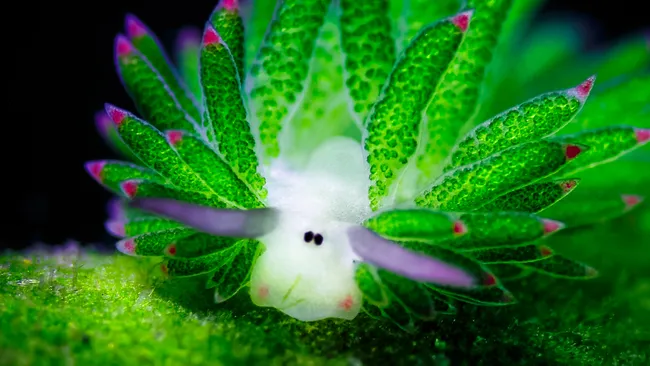Known for its uncanny resemblance to the TV character Shaun the Sheep, this adorable sea slug munches on algae to steal its ability to photosynthesize and become solar-powered.
Leaf Sheep (Costasiella kuroshimae): The Solar-Powered Sea Slug
Habitat: Shallow waters across Asia and the Coral Triangle.
Diet: Algae.
Why It’s Amazing:
The leaf sheep, also nicknamed the “Shaun the Sheep” sea slug, stands out for its adorable appearance and unique biological traits. With white faces, tiny black eyes, and ear-like rhinophores covered in sensory hairs, they resemble the beloved TV character Shaun the Sheep. Their green, leaf-like cerata not only enhance their cuteness but also serve as a camouflage mechanism and aid in respiration by increasing surface area for gas exchange.
At just 0.3 inches (8 mm) long, these sea slugs were first discovered off Japan’s Kuroshima Island in 1993. Since then, they’ve been spotted in the Philippines, Indonesia, Singapore, and Thailand, thriving in shallow waters near coral reefs where they graze on algae.
Solar-Powered Survival
What truly sets the leaf sheep apart is its ability to perform kleptoplasty, a rare process where it “steals” chloroplasts from algae it consumes. These chloroplasts, essential for photosynthesis, are stored in the slug’s tissues, allowing it to generate energy directly from sunlight for up to 10 days.
This clever adaptation not only provides food but also enhances its survival by making it less reliant on constant feeding. The process makes the leaf sheep one of the few animals capable of photosynthesis, joining the ranks of corals, spotted salamanders, and giant clams.
Expert Insight:
Miguel Azcuna, a marine natural products chemistry professor, likens this adaptation to eating a salad and keeping its chloroplasts to generate energy by simply basking in sunlight. He highlights the convenience of this survival mechanism, which helps the slug thrive in its environment.
The leaf sheep’s unique combination of cuteness and remarkable biology continues to fascinate marine.
